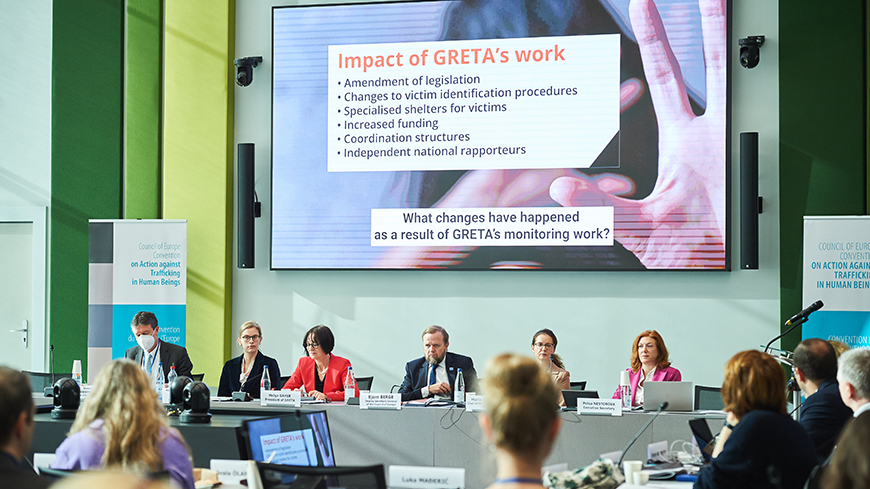The Group of Experts on Action against Trafficking in Human Beings (GRETA) has taken stock today of its 15 years of monitoring the implementation of the Council of Europe Anti-Trafficking Convention, on the occasion of its 50th plenary meeting. Its latest publication on “The practical impact of GRETA’s work” highlights many positive measures taken by States Parties to strengthen their legislations and policies to combat human trafficking. Examples include changes to the criminalisation of human trafficking, the adoption of provisions on the recovery and reflection period and residence permits for victims of trafficking, and the adoption of a specific provision on the non-punishment of victims of trafficking. The monitoring work of GRETA has also triggered changes to the procedures for identifying victims of trafficking, the setting up of specialised shelters for such victims, and increased funding for victim assistance.
“GRETA’s success is due to a large extent to the rigour of its monitoring work, with reports on issues ranging from gender equality to the needs of the most vulnerable groups, including children and minorities. The three evaluation rounds that have been conducted, comprising over 130 country visits, provide a clear picture of the trends, practices and challenges that affect State Parties to the Convention,” said Bjørn Berge, Deputy Secretary General of the Council of Europe at the opening of the meeting.
“During these times of crisis, GRETA is playing an important part in ensuring that the Anti-Trafficking Convention is fully implemented. This is particularly relevant in the context of Russia's war of aggression against Ukraine,” stressed Helen Lorez-Schweig, Deputy Permanent Representative of Liechtenstein to the Council of Europe, recalling that Liechtenstein had supported the development of the Commentary on the Council of Europe Convention on Action against Trafficking in Human Beings by the Ludwig Bolzmann Institute of Human Rights (Austria).
The Chair of the Committee of the Parties to the Convention, Ambassador Maria Spassova, Permanent Representative of Bulgaria to the Council of Europe, stressed that States Parties must continue to treat GRETA’s reports with utmost seriousness and undertake the follow-up action requested by GRETA and the Committee of the Parties.
“The work undertaken by GRETA over the past 15 years has enabled many positive changes and we are keen to continue it with the 4th round of evaluation of the Convention, which is centred on vulnerabilities to human trafficking and measures taken by States Parties to prevent and detect them, including a focus on the use of information and communication technology,” concluded Helga Gayer, President of GRETA.
Photos gallery (Flickr)
* * *
The Group of Experts on Action against Trafficking in Human Beings (GRETA) is an independent body which monitors the way countries implement the Council of Europe Convention on Action against Trafficking in Human Beings. All 46 member states of the Council of Europe are bound by the Convention, as well as non-member states Belarus and Israel.




